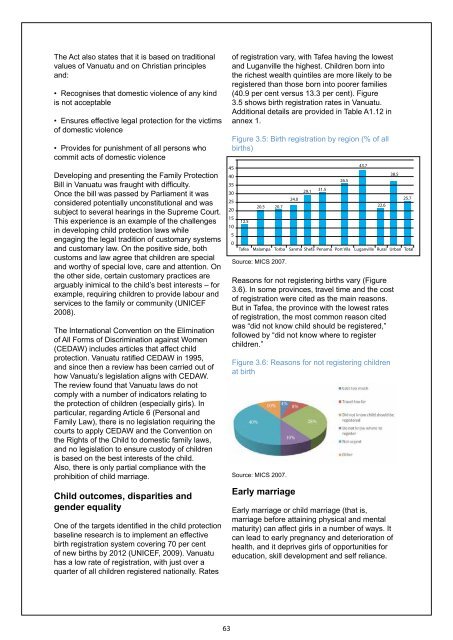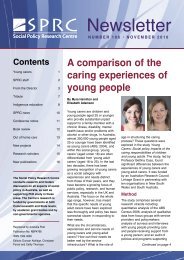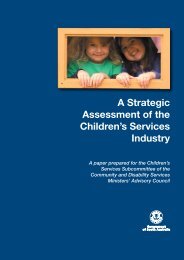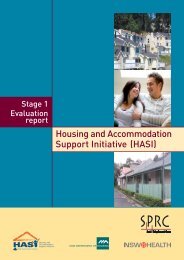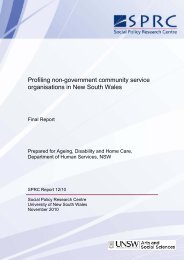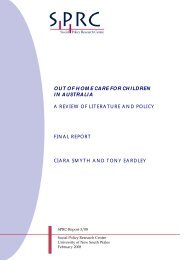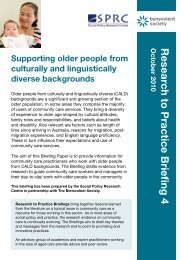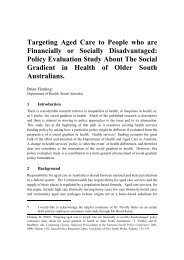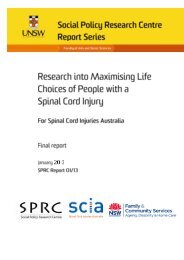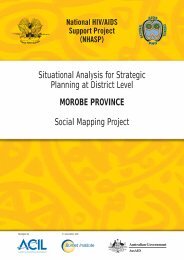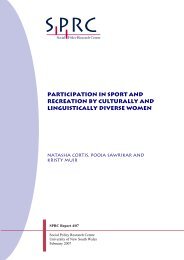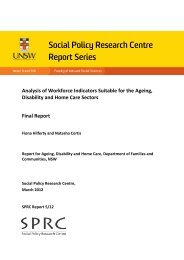Global Study On Child Poverty And Disparities (PDF) - Social Policy ...
Global Study On Child Poverty And Disparities (PDF) - Social Policy ...
Global Study On Child Poverty And Disparities (PDF) - Social Policy ...
You also want an ePaper? Increase the reach of your titles
YUMPU automatically turns print PDFs into web optimized ePapers that Google loves.
The Act also states that it is based on traditional<br />
values of Vanuatu and on Christian principles<br />
and:<br />
• Recognises that domestic violence of any kind<br />
is not acceptable<br />
• Ensures effective legal protection for the victims<br />
of domestic violence<br />
• Provides for punishment of all persons who<br />
commit acts of domestic violence<br />
Developing and presenting the Family Protection<br />
Bill in Vanuatu was fraught with difficulty.<br />
<strong>On</strong>ce the bill was passed by Parliament it was<br />
considered potentially unconstitutional and was<br />
subject to several hearings in the Supreme Court.<br />
This experience is an example of the challenges<br />
in developing child protection laws while<br />
engaging the legal tradition of customary systems<br />
and customary law. <strong>On</strong> the positive side, both<br />
customs and law agree that children are special<br />
and worthy of special love, care and attention. <strong>On</strong><br />
the other side, certain customary practices are<br />
arguably inimical to the child’s best interests – for<br />
example, requiring children to provide labour and<br />
services to the family or community (UNICEF<br />
2008).<br />
The International Convention on the Elimination<br />
of All Forms of Discrimination against Women<br />
(CEDAW) includes articles that affect child<br />
protection. Vanuatu ratified CEDAW in 1995,<br />
and since then a review has been carried out of<br />
how Vanuatu’s legislation aligns with CEDAW.<br />
The review found that Vanuatu laws do not<br />
comply with a number of indicators relating to<br />
the protection of children (especially girls). In<br />
particular, regarding Article 6 (Personal and<br />
Family Law), there is no legislation requiring the<br />
courts to apply CEDAW and the Convention on<br />
the Rights of the <strong>Child</strong> to domestic family laws,<br />
and no legislation to ensure custody of children<br />
is based on the best interests of the child.<br />
Also, there is only partial compliance with the<br />
prohibition of child marriage.<br />
<strong>Child</strong> outcomes, disparities and<br />
gender equality<br />
<strong>On</strong>e of the targets identified in the child protection<br />
baseline research is to implement an effective<br />
birth registration system covering 70 per cent<br />
of new births by 2012 (UNICEF, 2009). Vanuatu<br />
has a low rate of registration, with just over a<br />
quarter of all children registered nationally. Rates<br />
of registration vary, with Tafea having the lowest<br />
and Luganville the highest. <strong>Child</strong>ren born into<br />
the richest wealth quintiles are more likely to be<br />
registered than those born into poorer families<br />
(40.9 per cent versus 13.3 per cent). Figure<br />
3.5 shows birth registration rates in Vanuatu.<br />
Additional details are provided in Table A1.12 in<br />
annex 1.<br />
Figure 3.5: Birth registration by region (% of all<br />
births)<br />
45<br />
40<br />
35<br />
30<br />
25<br />
20<br />
15<br />
10<br />
5<br />
0<br />
12.5<br />
20.5 20.7<br />
Reasons for not registering births vary (Figure<br />
3.6). In some provinces, travel time and the cost<br />
of registration were cited as the main reasons.<br />
But in Tafea, the province with the lowest rates<br />
of registration, the most common reason cited<br />
was “did not know child should be registered,”<br />
followed by “did not know where to register<br />
children.”<br />
Figure 3.6: Reasons for not registering children<br />
at birth<br />
Source: MICS 2007.<br />
24.0<br />
Early marriage<br />
29.1<br />
Early marriage or child marriage (that is,<br />
marriage before attaining physical and mental<br />
maturity) can affect girls in a number of ways. It<br />
can lead to early pregnancy and deterioration of<br />
health, and it deprives girls of opportunities for<br />
education, skill development and self reliance.<br />
31.5<br />
Tafea Malampa Torba Sanma Shefa Penama Port Vila Luganville Rural Urban Total<br />
Source: MICS 2007.<br />
40%<br />
10% 4% 8%<br />
10%<br />
28%<br />
26.5<br />
43.7<br />
22.6<br />
38.5<br />
25.7<br />
63


